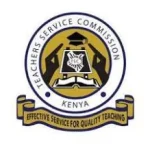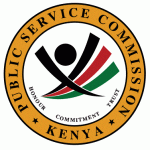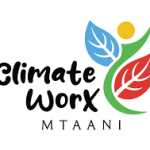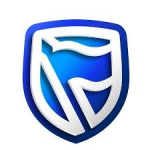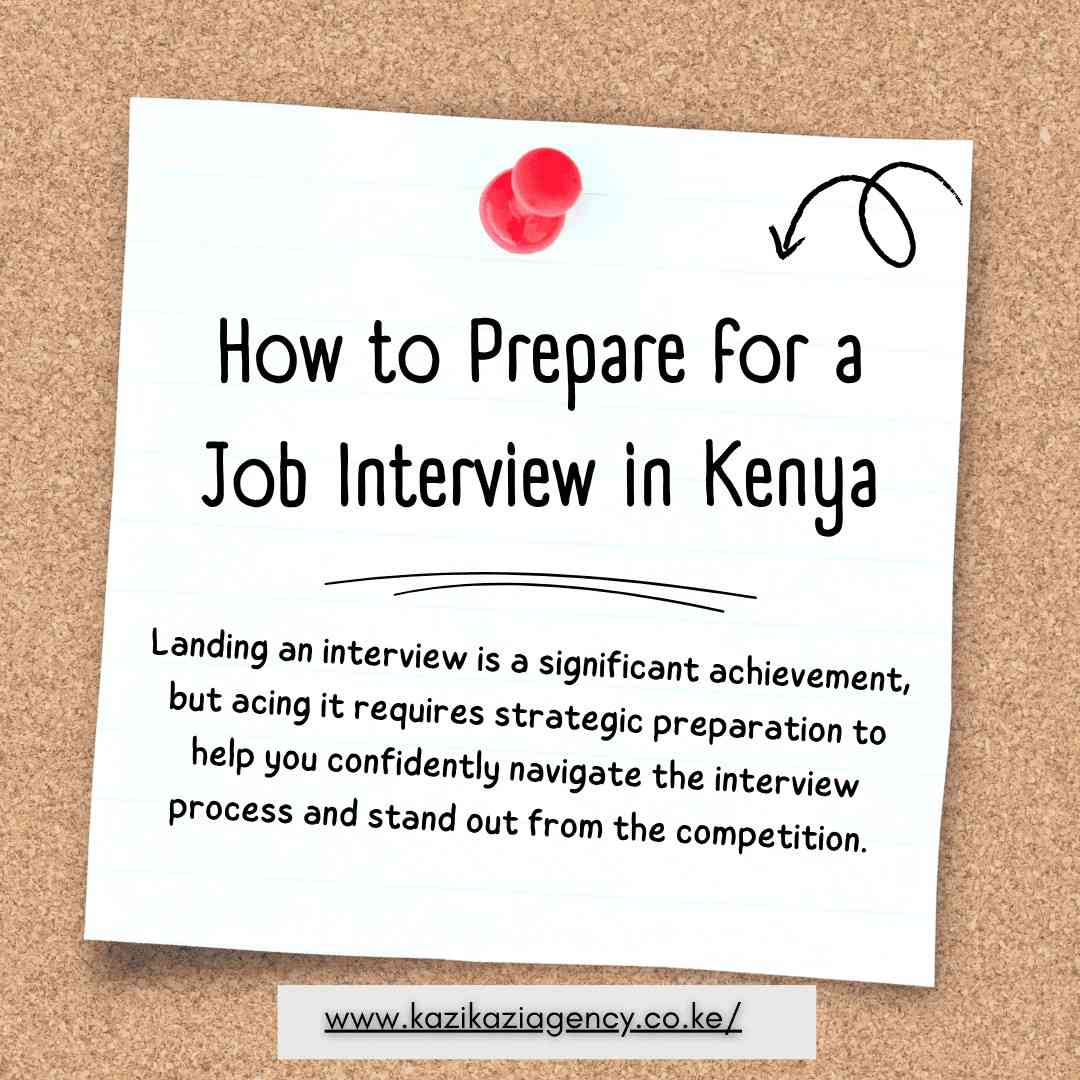5 Steps How to Prepare for a Job Interview in Kenya – Ultimate Guide
How to prepare for a job interview in Kenya
Landing an interview is a significant achievement, but acing it requires strategic preparation to help you confidently navigate the interview process and stand out from the competition. Preparing for a job interview is one of the most important steps in your career journey. Whether you’re a fresh graduate, an experienced professional, or making a career shift, walking into an interview well-prepared boosts your confidence and increases your chances of landing your dream job. This article offers a step-by-step guide on how to prepare for a job interview.
Lack of interview preparation leads to hesitating or rambling under pressure, which can lead to failure regardless of your qualifications.
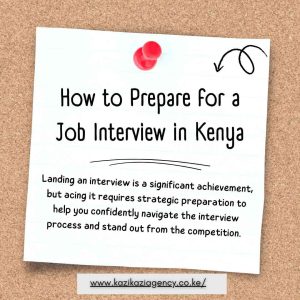
Introduction to How to Prepare for a Job Interview
Many job seekers in Kenya often ask themselves, “How can I pass an interview successfully?”, and the answer lies in proper interview preparation, understanding common interview questions and answers, dressing professionally, researching the company in advance, practicing confident communication, and learning how to make a great first impression to stand out from other candidates during the job interview process.
In this guide, we’ll take you through 5 essential steps on how to prepare for a job interview in Kenya, from researching the company to tailoring your answers, ensuring you’re prepared to make a lasting impression.
A job interview checklist for Kenya to help you stand out in a job interview.
- Research the Company and Role
- Practice Common Interview Questions
- Best Interview Practices – Prepare Your Documents, Outfit, Logistics, Posture
- Rehearse Your Elevator Pitch and Questions – Speak With Confidence and Clarity
- Follow Up – Leave a Lasting Impression After the Interview
Step 1: Research the Company and Role
Know the Company: What to research about a company before an interview?
Before the interview, take time to research the company you’re applying to. You can achieve this by visiting its website, examining its financial health, and browsing its social media.
Understand their mission, values, the company’s history, current leadership, products/services, competitors, overall market position, and recent news. Look for press releases, annual reports, and social media presence to gain a holistic understanding.
Why is it important to research the company and the role before attending an interview? Helps you gain a better understanding of the company’s culture, values, and goals, which can help you tailor your responses to the interviewer’s questions. It can also help you identify a problem, which you can highlight how can solve.
Know Your Role:
Learn about the job role in detail, what it entails, specific skills required for the role, and how your background aligns with it.
Analyze the job description meticulously. Identify the key skills and responsibilities. Think about how your experience aligns with the employer’s requirements.
This allows you to tailor and highlight relevant skills and achievements in your answers.
Thorough interview preparation helps you understand the employer’s expectations and allows you to tailor your answers for more effective responses, showcasing your genuine interest and suitability for the position.
What to do: How to research a company/role before an interview?
- Visit the company’s website and social media pages
- Read recent news, projects, or achievements
- Understand the job description and responsibilities
Example:
If you’re interviewing for a Sales and Marketing role at Safaricom, familiarize yourself with their customer support channels, products like M-PESA, and service delivery models. Tailor your answers to highlight all your relevant skills and qualifications that align with that role.
Tailor your response, highlighting your strengths in that specific field, showcasing how you can help the company succeed in that given area.
“In my previous role at Company ABCDE, I consistently exceeded my sales targets by 15%, demonstrating my commitment to exceeding expectations—a value I see reflected in [Target Company]’s recent growth in the [Market Segment] sector.”
Why it matters: What are the advantages of doing company research before an interview?
- It shows the interviewer that you’re genuinely interested and that you conducted your research thoroughly
Step 2: Practice Common Interview Questions
One of the most effective ways to prepare for a job interview is by practicing how to answer common job interview questions.
Preparing how to answer interview questions is more than memorizing answers – it’s about understanding your story, aligning it with the employer’s needs, and communicating it with confidence and authenticity.
Every interviewer wants to know who you are, why you applied, and what makes you a good fit for the role.
This helps you to tailor your answers and respond confidently, clearly, and professionally, marketing yourself impactfully.
Common Questions in Kenya:
- Tell us about yourself
- Why do you want to work here?
- What are your strengths and weaknesses?
- Describe a challenge you faced and how you solved it
- Where do you see yourself in five years?
- Why should we hire you?
- Do you work better in a team or alone?
- What do you know about our company?
- Do you have any questions for us?
- What are your salary expectations?
Practice on both behavioral and technical questions.
- Behavioral Questions (STAR Method): These assess your past behavior to predict future performance.
- Technical Questions: These assess your skills and knowledge related to the role.
Use the STAR Method (Situation, Task, Action, Result) when answering experience-related questions.
How to Practice Interview Questions Effectively
-
Write down your answers to key questions. Tailor your answers to answer these questions in alignment with the role you are applying for and the company.
-
Analyze your body language and tone
-
Join mock interviews offered by recruitment agencies or online communities
-
Tailor answers for each role based on the job description
Pro Tips to Stand Out
- Use powerful action verbs: Led, improved, managed, developed, resolved
- Quantify your results: E.g., “increased efficiency by 30%” or “served 100+ clients per week”
- Keep answers concise but meaningful: 1–2 minutes per question
- Bring a confident, positive tone—not memorized, but prepared
- Be honest—interviewers appreciate sincerity over perfection
Interview preparation isn’t just about memorizing answers—it’s about knowing your story, aligning it with the role, and communicating it with confidence and clarity.
By practicing common interview questions and tailoring your responses, you increase your chances of leaving a lasting impression and landing the job.
Example:
- Describe a challenge you faced and how you solved it
Answer: (STAR Method)
“In my previous role as a Sales Assistant, I noticed our sales had dropped by 15%. I analyzed customer feedback (Situation), identified delays in response time (Task), suggested a WhatsApp-based order system (Action), and within two months, we saw a 20% increase in daily orders (Result).”
Step 3: Best Interview Practices – Prepare Your Documents, Outfit, Logistics, Posture
First impressions count—and in an interview, they often start before you even speak and could be the tie-breaker that lands you the job or disqualifies you at the early stages.
From the time you arrive for the interview, how you dress to how you present your documents tells a lot about your professionalism, attention to detail, and seriousness about the job.
Keeping everything professional, having a professional attire, arriving in time, and having well-organized documents shows the interviewer that you’re organized, respectful, and job-ready.
Your appearance and preparedness contribute significantly to your overall impression.
- Choose Appropriate Attire: Research the company culture. A formal suit is generally a safe bet for most corporate roles, but a business casual outfit might suffice in more relaxed environments. Ensure your clothes are clean, ironed, and fit well.
- Plan Your Route: Account for potential traffic delays and arrive 10-15 minutes early. This demonstrates punctuality and respect for the interviewer’s time.
- Prepare Your Materials: Bring extra copies of your resume, a notepad for taking notes, and a pen. Having these ready shows organization and preparedness.
Why These Steps Matter
Employers in Kenya often interview many candidates for one role. Small details like neatly arranged certificates, a well-printed CV, and appropriate attire can give you a competitive edge.
Being well-prepared also gives you confidence, which can boost your performance during the interview.
What Documents to Carry for a Job Interview in Kenya
Prepare a clean folder or envelope and neatly arrange all necessary documents. Here’s a checklist:
Mandatory Documents:
- Updated CV/Resume (at least 2–3 printed copies)
- Original & Photocopies of academic certificates (KCSE, Diploma, Degree)
- National ID card
- Professional certificates (e.g., CPA, IT, HRM, Driving, Teaching, etc. – optional)
- Reference letters or testimonials from previous employers or institutions
Optional but Useful Documents:
- Portfolio (for creatives, marketers, teachers, designers, etc.)
- TSC Registration Certificate (for teachers)
- Driving license & PSV badge (for drivers)
- NHIF/NSSF numbers or KRA PIN (for roles requiring registration)
- Passport-size photos (if requested)
- Notepad and pen – For taking notes during the interview
Plan Your Transport
Plan your transport and route early to ensure you arrive at the interview on time. Arriving 15–30 minutes before the time shows you’re reliable and professional.
Tips:
- Map the interview location the day before
- Carry fare, airtime, and emergency contacts
- Avoid being late or too early
- Maintain polite, respectful behavior with everyone, including reception staff
Dress Code: How to Dress for an Interview in Kenya
Your attire should be neat, conservative, and appropriate for the type of job you’re applying for. Even if the company has a casual dress culture, always dress slightly more formally for interviews.
For Men:
- A clean, ironed long-sleeved shirt (plain or subtly patterned)
- Trousers (not jeans) in dark or neutral colors
- Polished closed shoes
- Optional: Tie and blazer (especially for office/corporate roles)
- Well-groomed hair and trimmed facial hair
For Women:
- A formal blouse or shirt with a skirt or tailored trousers
- Closed or flat shoes—avoid overly high heels or sandals
- Minimal jewelry and makeup
- Neatly styled hair—avoid flashy hairstyles for formal roles
- A simple handbag or folder to carry documents
What to Avoid Wearing During a Job Interview:
- Ripped jeans or casual T-shirts
- Excessive perfume or cologne
- Loud colors or over-accessorizing
- Open shoes/slippers (unless specified)
- Overly tight or revealing clothing
- Branded caps or hats
Other Preparation Tips:
- Iron your clothes a day before
- Pack your bag and documents the night before
- Plan your route and estimate travel time
- Arrive at least 15–30 minutes early
- Carry a digital copy of your CV on your phone or a USB, especially if you’re going for a walk-in interview or applying at multiple places. Employers might ask you to forward a soft copy on the spot.
Dressing well and organizing your documents may seem basic, but these are often the first things an interviewer notices.
They reflect how much you care about the opportunity and how well you might represent their organization.
So, whether you’re applying as an accountant, driver, teacher, or customer service assistant, take this step seriously.
Your appearance and preparedness say a lot about your professionalism.
Always carry necessary documents neatly arranged and dress appropriately for the job.
Checklist of What to Carry for a Job Interview:
- Several copies of your CV
- Academic and professional certificates (originals & photocopies)
- Valid ID
- Reference letters or testimonials (if available)
- A notebook and pen
Dress Code Tips:
-
Men: Clean, ironed shirt, trousers, and closed shoes (tie optional, depending on the company)
-
Women: Neat blouse with skirt or trousers, minimal accessories, clean shoes
Example:
- For a corporate interview in Nairobi, avoid casual wear (jeans, sneakers, or t-shirts). Choose smart office wear to show seriousness.
Step 4: Rehearse Your Elevator Pitch and Questions – Speak With Confidence and Clarity
Preparing for an interview isn’t just about answering questions — it’s also about presenting yourself as the ideal candidate in a short, compelling way.
This is where your elevator pitch and thoughtful questions come in.
These two areas can significantly influence how you’re perceived and can leave a lasting impression on your interviewers.
What is an Elevator Pitch in an interview?
An elevator pitch is a 30–60-second summary of who you are, what you do, and why you’re a great fit for the role.
Think of it as your verbal “CV professional summary” — short, sharp, and memorable.
It’s typically used to answer one of the most common opening questions: “Tell us about yourself.”
Why Your Elevator Pitch Matters
- It sets the tone for the entire interview
- Shows you’re prepared, self-aware, and focused
- Helps you stand out from other candidates who ramble or sound unsure
- Gives the interviewer a clear snapshot of your skills, experience, and passion
How to Structure Your Elevator Pitch (4 Simple Parts)
- Who are you? (Name, qualification, profession/role)
- What do you do or what have you done? (Current/previous role, key skill or experience)
- What are your key strengths or achievements? (Pick 1–2 relevant to the job)
- Why are you interested in this role/company?
Sample Elevator Pitch – For a Recent Graduate
“My name is Kevin Otieno, a recent graduate with a Bachelor’s Ddegree in Business Management from Murang’a University of Technology. During my attachment at ABC Limited, I helped streamline inventory operations and supported the accounts team in daily tasks. I’m passionate about administration and client service, and I’m excited about this opportunity to bring value and grow with your team.”
Sample Elevator Pitch – For an Experienced Teacher
“I’m Faith Wambui, a TSC-registered primary school teacher with over 5 years’ experience teaching Science and English under the CBC curriculum. I’ve mentored students who went on to win national essay competitions and served as a class teacher for Grade 6. I’m now looking to join a forward-thinking school that prioritizes learner development and innovation.”
Prepare Smart Questions to Ask the Interviewer
Near the end of most interviews, you’ll be asked: “Do you have any questions for us?”
This is not a formality. It’s your chance to:
- Show that you’re serious and curious
- Demonstrate that you’ve done your research
- Clarify any concerns about the role
- Engage in a professional two-way conversation
Good Questions to Ask During an Interview
- “What does a typical day look like in this role?”
- “What qualities are you looking for in the ideal candidate?”
- “How does the company support staff growth or training?”
- “How is performance evaluated for this position?”
- “What are the next steps after this interview?”
Questions to Avoid Asking During an Interview
- “How much will I be paid?” (unless asked or at offer stage)
- “How many leave days do I get?” (too early to ask)
- “What does your company do?” (shows lack of research)
- “Can I work from home?” (unless mentioned in the job post)
Pro Tips to Nail Your Pitch & Questions
- Practice your pitch out loud – Aim for confidence, not memorization.
- Avoid jargon – Use clear, simple language.
- Tailor your pitch to the role – Emphasize relevant experience.
- Speak with enthusiasm – Show passion for the opportunity.
- Ask 2–3 meaningful questions – Not too many, not none.
- Practice with a friend or record yourself – Identify weak points.
Your elevator pitch is your first impression, and your questions are your final impression. Mastering both shows that you’re not only qualified but also strategic, professional, and invested in your future.
These are the small details that help employers remember you when they’re choosing between candidates
Step 5: Follow Up – Leave a Lasting Impression After the Interview
Most job seekers assume the interview is over once they walk out of the room—but the truth is, what you do after the interview can be just as important as what you said during it.
A professional and timely follow-up message shows that you’re courteous, proactive, and truly interested in the role. In a competitive job market like Kenya’s, this small gesture can set you apart from other candidates who don’t bother.
Why Following Up Matters
- It reinforces your interest in the position
- Keeps your name fresh in the interviewer’s mind
- Shows appreciation and respect for the panel’s time
- It’s a chance to briefly highlight something you forgot to mention
- It opens communication and may speed up the decision process
When to Follow Up
- Within 24–48 hours after the interview
- If you were given a specific date for feedback, wait until that day has passed, then follow up once
How to Follow Up Professionally
You can follow up through:
- Email (preferred method, especially for formal roles)
- SMS or WhatsApp (acceptable for informal roles, startups, or if communication was previously via phone)
Sample Follow-Up Email (Formal Job Role)
Subject: Thank You for the Interview – [Your Full Name]
Dear [Interviewer’s Name],
Thank you for the opportunity to interview for the [Job Title] position at [Company Name] on [Day/Date]. I truly enjoyed our conversation and learning more about the exciting work your team is doing.
I remain very interested in the role and believe my background in [brief skill or achievement] would allow me to contribute meaningfully to your organization.
Please do not hesitate to reach out if you need any further information. I look forward to the possibility of working with your team.
Warm regards,
[Your Full Name]
[Phone Number]
[Email Address]
Sample Follow-Up SMS (Informal Role)
Good morning, Mr. Otieno. Thank you for the interview opportunity for the Shop Assistant role yesterday. I enjoyed the session and would love to be part of your team. Kindly let me know if any further information is needed. – Joyce Wanjiru
What NOT to Do When Following Up
- Don’t follow up too soon (e.g., immediately after the interview)
- Don’t message late at night or on weekends
- Don’t pressure the employer or demand a decision
- Avoid sending multiple messages—one polite follow-up is enough
Pro Tips to Leave a Lasting Impression
- Personalize your message – Mention something specific from the interview (e.g., a project, value, or challenge discussed).
- Proofread before sending – Ensure your message is clear and error-free.
- Keep it brief – Be polite, professional, and to the point.
- Be gracious even if you’re not selected – You never know about future openings.
- Connect on LinkedIn – If appropriate, request to connect professionally to stay on their radar.
A thoughtful follow-up shows that you’re not just another applicant—you’re a professional who values communication and relationships.
In Kenya’s growing and competitive job space, this simple action might be the nudge an employer needs to choose you over someone else.
Bonus: Tips to Stand Out in Your Interview
To truly make a great impression:
- Smile and maintain good eye contact – It shows confidence.
- Give examples when answering – Show, don’t just tell.
- Bring a positive, energetic attitude – Employers hire personality as well as skills.
- Follow up with a thank-you email or SMS – Express appreciation and reinforce your interest in the job.
- Tailor your answers to show how you’ll add value – Think: What problem can I solve for this employer?
- Bonus Tip: Turn off or silence your phone before the interview begins.
- Mock Interviews: Ask a friend, family member, or career counselor to conduct a mock interview. This provides valuable feedback on your delivery, body language, and overall presentation. Focus on maintaining eye contact, speaking clearly, and conveying enthusiasm.
Here’s what effective interview preparation involves:
- Self-awareness: You need to know your strengths, weaknesses, career goals, and professional journey. Understand how your past experiences have shaped you, and be ready to talk about them honestly.
- Contextual thinking: Rather than repeating a textbook answer, relate your response to the specific role and company. For example, if asked about teamwork, don’t just say you’re a team player—describe a time when your collaboration improved results in a past job.
- Show genuine enthusiasm: Let your passion for the role and the company shine through.
- Ask insightful questions: Prepare thoughtful questions that demonstrate your engagement and understanding of the company.
- Highlight your unique selling points: Focus on your skills and experiences that differentiate you from other candidates.
- Personal storytelling: Interviewers remember stories, not rehearsed lines. Share real-life situations where you solved a problem, handled a challenge, or contributed to a project. Use the STAR method (Situation, Task, Action, Result) to structure your stories clearly and effectively.
- Authenticity and presence: A well-prepared candidate doesn’t just know what to say, but also how to say it. Your tone, body language, and attitude must reflect sincerity and enthusiasm. Confidence is not about perfection; it’s about being prepared and genuine.
- Adaptability: Sometimes, interview questions can catch you off guard. True preparation means you’re mentally ready to adapt your answers, think critically, and remain calm even when asked unexpected questions.
- Demonstrate your problem-solving skills: Use the STAR method to illustrate your ability to tackle challenges effectively.
Final Thoughts on How to Prepare for a Job Interview
Job Interview Preparation is the bridge between opportunity and success.
By following these five simple but powerful steps, you can walk into your next interview ready to impress.
Whether you’re applying for your first job or a senior position, taking the time to research, rehearse, and present yourself professionally will set you apart from the rest.
Job Search Tips Resources
Top Skills Employers Are Looking For in 2024
The Best Online Jobs Platforms
A Good CV Increases Your Chances of Getting an Interview
